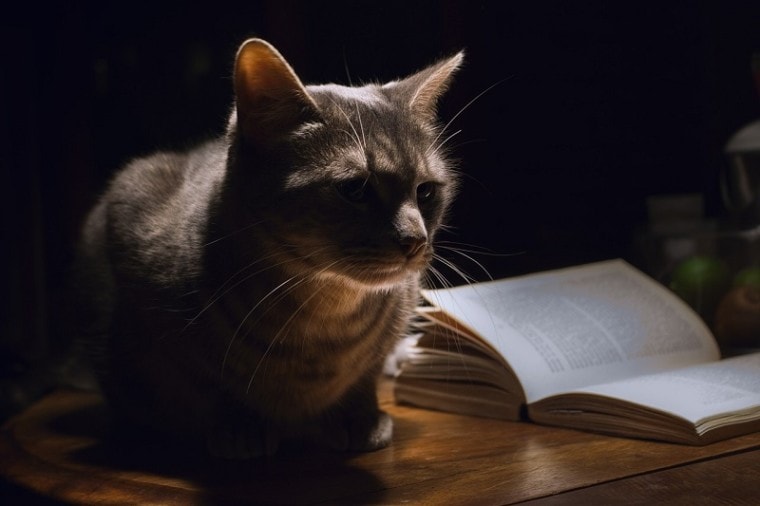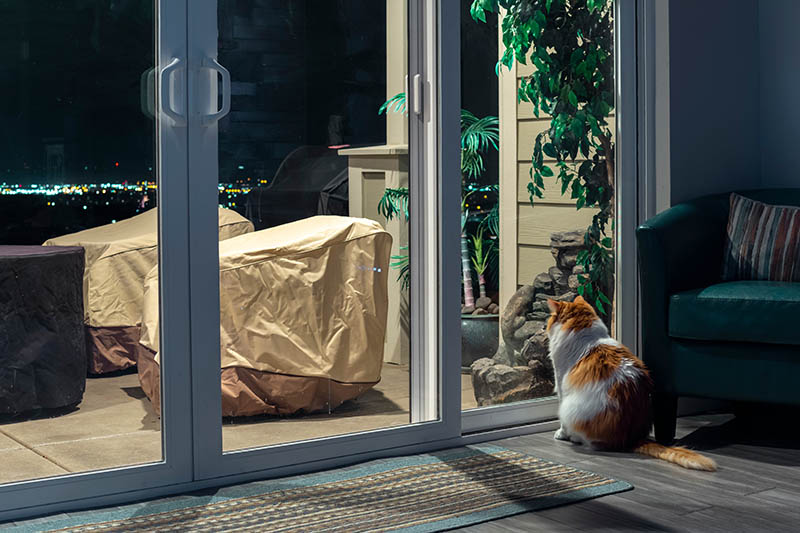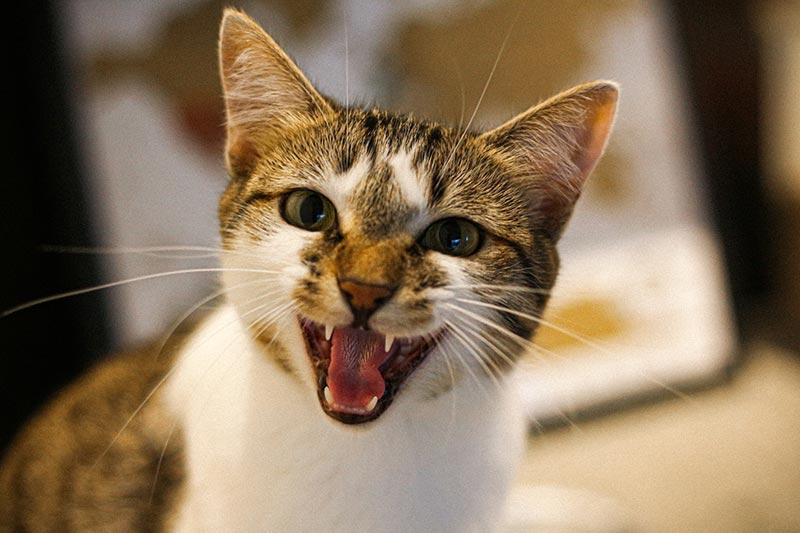
Cats are amazing creatures that bring us love, joy, and companionship. But sometimes they do odd things, which is why they’re so loveable! Anyone who’s ever lived with one of these beautiful beings has most likely been woken up in the middle of the night by wild feline antics—probably more than once!
So why does your beloved feline decide to meow at night? Are they ok, or are they just being a cat? Meowing at night is normal; cats are crepuscular creatures and are most active at dawn and dusk, so many cats get energetic in the wee hours. But there are things you can do to nudge your cat away from the midnight meows after you identify the cause. Read on to learn more about nine reasons cats meow at night and how to stop it.
The 9 Reasons Your Cat Is Meowing At Night
1. Feline Crepuscular Preferences

Cats love to prowl and hunt when the light is low. Dusk and dawn are popular feline activity times, so it’s totally normal for kitties to get active in the hours just before sunrise, which can easily feel like the middle of the night for a tired human trying to get 8 full hours of sleep.
Cats’ eyes are exquisitely developed for hunting in low light, so it makes perfect sense that your pet often decides to enjoy a romp around the house at 4 am! Try playing with your cat before bedtime to tire them out a bit; they may be more inclined to sleep through the night if they’re nice and worn out!
2. Exercise
Cats sometimes meow at night when they are feeling energetic. Cats, just like people, need regular physical activity and the urge to get active often comes at opposite times to humans. Cats need around 40 minutes of exercise per day to stay healthy. Veterinarians suggest breaking your sessions up into several short 10-minute sessions1 to keep things fresh and interesting for your pet.
3. Separation Anxiety

Some cats dislike being left alone, and many suffer from separation anxiety when away from their owners. Cats love their humans, and many that don’t get enough attention are happy to tell you about it, meowing to let you know their needs are not being met.
Separation anxiety is not attention-seeking behavior but a serious sign that a cat needs more playtime, activity, mental stimulation, and attention from their family. Cats with this condition may have other signs such as grooming excessively and urinating outside of the litter box.
4. Aging
While some older cats do just fine getting around and being wild into their 20s, others begin to suffer from cognitive decline as they age, one hallmark of which is meowing at night out of anxiety and disorientation. Most pets start showing minor behavioral and cognitive changes when they’re around 10, but true feline cognitive dysfunction is rarely seen in cats under 15.
Common indications that your cat may suffer from the condition include excessive vocalization, irritability, and altered sleep patterns. Affected kitties sometimes have trouble making it to the litter box on time and engage in excessive grooming.
5. Feeling Trapped

Outdoor cats that typically come inside to sleep sometimes meow because they want to go out. From the perspective of an adventurous feline, being stuck inside in those magic wee hours when mice and rabbits scurry around is nearly unbearable! There’s no one to play with or follow around.
If you’re committed to allowing your pet to roam outside on their own, consider investing in a cat door to let your buddy come and go as they please to keep things quiet at night.
6. Being in Heat
Unspayed female cats often hit the meows hard when they’re in heat. Queens have a 2–3 week estrus cycle during which they’re usually in active heat for around 7 days. But there’s quite a bit of variation, as cats remain fertile for 2–19 days. If they are not pregnant they will come into heat again in 2 to 3 weeks. Cats in heat exhibit several marked behavioral changes.
In addition to excessive vocalization, many become extremely affectionate and engage in repeated escape attempts. They’ll also spray and rub against things with their tails held high. Spayed cats don’t have these hormonally-driven behavioral changes and also have reduced chances of developing breast cancer or pyometra.
7. Medical Conditions

While it’s often normal for cats to meow at night, changes in vocalization can sometimes indicate that your pet is ill. Cats suffering from hyperthyroidism and kidney disease often vocalize at night and exhibit sleeping pattern changes. Meowing at night is usually normal, but if your cat suddenly begins to vocalize more intensely or for longer periods than usual, it might be time to see a veterinarian, particularly if there are other signs of illness such as lethargy, increased thirst, altered appetite, gastrointestinal problems, or lack of appetite which last for more than 24–48 hours. Chronic kidney disease (CDK) is particularly common in senior cats, but early detection and treatment generally improve long-term outcomes.
8. Breed
While some cats are mellow and barely let out a peep, and others are a bit more vocal, there are breeds with a reputation for enjoying a good conversation. Siamese kitties are famous for their vocalization and the deep bonds they form with people.
Bengal and Japanese bobtail cats also come in high on the list of breeds with a tendency to enjoy a good meow or two. Bengal cats are known for their willingness to vocalize their displeasure.
9. Anxiety

When cats become anxious, some tend to meow. Kitties become stressed for various reasons, from too much noise to unwelcome routine changes. Most don’t care for food, litter, or environmental changes in general. Repetitive loud noises and routine changes also cause feline stress, as do new additions such as babies and new pets.
Anxious cats often lick themselves excessively and pace when they’re stressed. Scared cats can sometimes become aggressive, so it’s best not to try to approach a frightened kitty. Be still and stay with your buddy until they calm down enough to be handled. If your cat is exhibiting anxious behaviors regularly contact your veterinarian for advice.
Conclusion
Cats meow at night for all kinds of reasons; it’s an inherent part of their adorable feline nature! As crepuscular creatures, cats enjoy being active in the hours around dusk and dawn, which makes sense as their eyes are exquisitely developed to locate scurrying prey in low light. But while a bit of feline vocalization at night is normal, there are times when it can be cause for concern.
Reach out to your veterinarian if your cat starts meowing more than usual and you see other indications of sickness, such as lethargy or change of appetite. But for most healthy adult cats, a quick session with a teaser before bedtime is usually the best way to encourage a bit of nighttime peace.
Featured Image Credit: mariavp, Pixabay







